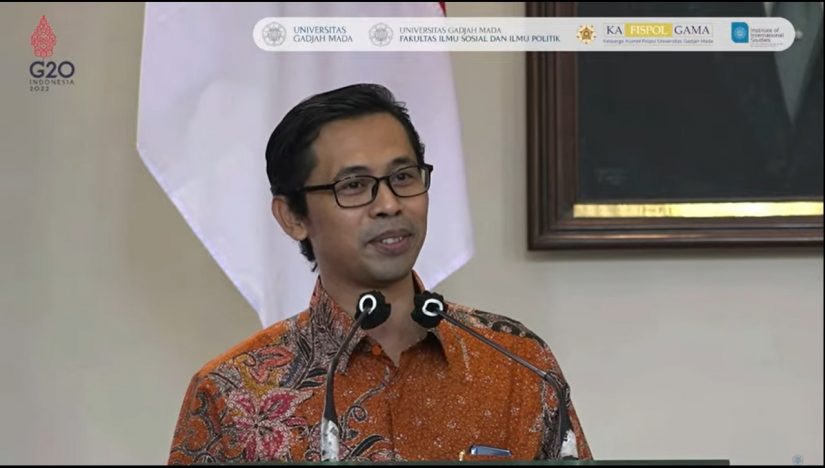
Yogyakarta, March 17th 2022─Faculty of Social and Political Sciences (Fisipol) Universitas Gadjah Mada (UGM), the Alumni Family of Fisipol UGM (Kafispolgama), and Institute of International Studies (IIS) of the Department of International Relations (HI) Fisipol UGM held a seminar “Recover Together, Recover Stronger: G20 and the Indonesian Strategic Agenda” at the Senate Hall of UGM.The opening seminar of the series of events entitled “G20 Indonesian Presidency: Leadership for a Just and Sustainable World Order” was officially opened by the Rector of UGM, Professor Panut Mulyono. In his speech, Prof. Panut hopes that this series of activities, which will be held from March 10 to September 19, 2022, can provide space for comprehensive studies and discussions about Indonesia’s leadership at the G20 of 2022. The Dean of Fisipol UGM, Wawan Mas’udi, and the Deputy General Chair of the Kafispolgama Partnership, Danang Girindrawardana, also gave remarks at this hybrid event. Wawan said that the output of this series of events consisted of policy papers, policy briefs, and a complete compilation book related to the presidency of the G20 Indonesia.
“In that way, we as an academic community can make a constructive, critical contribution, and hopefully be useful for the Indonesian presidency for the G20,” Wawan said.
This seminar presents a number of state officials as speakers. The first session, moderated by the lecturer of the Department of International Relations of UGM, Muhadi Sugiono, was filled by the Special Staff of the Minister of Foreign Affairs of the Republic of Indonesia (RI) as well as the G20 Co-Sherpa, Dian Triansyah Djani, and the Indonesian Minister of Health, Budi Gunadi Sadikin, regarding the G20. Dian said the G20 was formed to respond to the global crisis. On the other hand, Budi conveyed the message of the President of the Republic of Indonesia that the G20 meeting must produce real action, not just a narrative.
“The agenda is focused on health, the digital economy, and the energy transition,” Budi added.
In the first session, Professor of the Department of International Relations of UGM Prof. Mohtar Mas’oed and the Dean of the Faculty of Medicine, Public Health, and Nursing UGM. Prof. Ova Emilia became the responder. Prof. Ova views that the G20 is an opportunity to strengthen the health system and support country targets in the health sector. Prof. Mohtar suggested that the momentum of the G20 could be a guarantor of global prosperity, not just a “concert of economic power”.
Furthermore, the Coordinating Minister for Economic Affairs of the Republic of Indonesia Airlangga Hartarto delivered his material as a keynote speaker. Airlangga explained that the countries that are members of the G20 are the holders of 85 percent of the world economy, 75 percent of world trade, and 80 percent of global investment. Therefore, according to Airlangga, the G20 Presidency is a momentum for Indonesia to be on the main stage. He also hopes that the UGM academic community can support the three priority agendas of the G20 Presidency in Indonesia.
“I hope that this seminar and strategic agenda will get input from researchers in order to develop a research-based policy that can support the three priority agendas of the G20 Presidency in Indonesia,” Airlangga concluded.
In the second session, a lecturer of the Department of International Relations of UGM, Poppy Sulistyaning Winanti, moderated the discussion which presented the Minister of Energy and Mineral Resources of Republic Indonesia, Arifin Tasrif, and Spokesperson for the Ministry of Communication and Information of the Republic of Indonesia, Dedy Permadi, as speakers. Dedy showed the potential of the information and communication sector or the digital sector for Indonesia’s digital economy. Meanwhile, Arifin explained Indonesia’s energy transition plan, namely changing fossil energy sources into renewable energy, which is targeted to be achieved by 2060.
“One of the success factors for the energy transition is the readiness and availability of technology,” Arifin said.
The second session of the speaker material was then responded to by two responders, namely the Dean of the Faculty of Geography of UGM, Danang Sri Hadmoko, and a lecturer of the Department of International Relations of UGM, Riza Noor Arfani. Agreeing with Dedy, Riza assessed that digital transformation in Indonesia would help MSMEs and develop e-commerce in Indonesia. On the renewable energy side, Danang explained the impact and consequences of the energy transition on the environment as well as the steps to achieve zero-emission.
This opening seminar was attended by more than 300 people on the Zoom Meeting platform and ended at 04.30 p.m. This seminar was also witnessed by more than 1,500 viewers and can still be watched through the following YouTube channel of UGM here.
